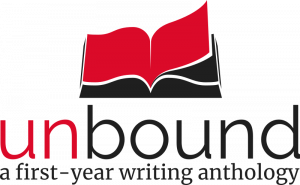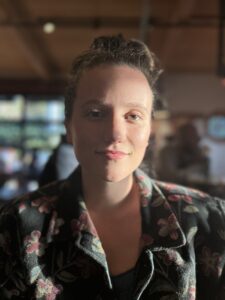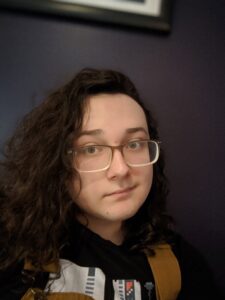Unbound: A First-Year Writing Anthology
Western Oregon University’s First-Year Writing Program publishes Unbound: A First-Year Writing Anthology, a digital collection of the exemplary work produced by students enrolled in WR 121z and WR 122z (Composition 1 and Composition 2). Unbound: A First-Year Writing Anthology celebrates the creative thinking, sophisticated prose, and impressive inquiry projects taken on by our students. The work in this anthology includes compositions in a range of genres and modalities, showcasing their identities as writers. To download a paper, click on the title. Student papers will download as fully accessible PDFs. If you identify an accessibility issue with a student paper, please contact Samantha Morgan at morgansam@mail.wou.edu. The views and opinions expressed by students in Unbound are those of the authors and do not necessarily reflect the official policy or position of Western Oregon University.
Volume 6
 Bribery: The Key to Literary Success
Bribery: The Key to Literary Success
Author: Danielle Bossé
Course: WR 121Z
Instructor: Matt Haas
Abstract: “Bribery: The Key to Literary Success” is a comical, conversational journey from one human to another about the tips, tricks, and trials of motivating to complete a writing assignment before the last minute. This piece, and the subsequent wisdom it tries to impart, comes from a lifetime battle with procrastination and a recent diagnosis of ADHD.
Bio English: Danielle is a born and raised Oregonian whose love of reading began with her discovery of Twilight at ten years old. She is an Auntie to two precious little humans and two gigantic fluffy dogs, a Licensed Massage Therapist (LMT), and a full-time student at WOU, majoring in Psychology and minoring in Biology. She loves to paint, draw, read novels, write and, like any self-respecting Oregonian, she loves to be outside.
Bio Español: Danielle creció en Oregon y empezó a amar los libros cuando leí “Twilight” cuando tenía diez años. Es tía de dos niñas tan chiquitas y dos perritos gigantes, es una terapista de masajes, y una estudiante de WOU. Su especialización es de psicología y su especialización secundaria es de biología. Le encanta pintar, dibujar, leer, y escribir. También le encanta estar fuera de casa como cualquier Oregonian.
Keywords: Procrastination, Psychology, Rewards, Writing Process, Writing Product, Personal Essay, Composition, Behaviorism
 Writing Constructs: Ethics in Plagiarism
Writing Constructs: Ethics in Plagiarism
Author: Oliver Hays
Course: WR 121Z
Instructor: Wesley Mathis
Abstract: “Ethics in Plagiarism” tries to take a closer look at our preconceived notions of plagiarism as a facet of academic honesty, and sees if they really hold up in a post-internet world. The essay tries to see how the definitions we use to describe plagiarism support some systems and discourage others and challenges that the stated goals of plagiarism’s current definitions aren’t supported in practice as much as in theory.
Bio: Oliver Hays is a junior studying art at Western Oregon University after transferring from the computer science program and bouncing between colleges trying to find the right fit. Raised by educators, they’ve always been passionate about how educational institutions and systems are run, which inspired the deeper dive on plagiarism presented in this essay, combining their two interests in code and art. Oliver plans to take their art degree into the world combining art and writing as a concept artist if possible, combining their passion for worldbuilding with their love for creative expression. They love all things creative, such as music, painting, design, writing, and much more.
Keywords: Plagiarism, AI, Generative AI, Similarity, ESOL, Ethics, Ownership of Ideas, Academic Dishonesty, Equity, Access
 Profanity in Academic Writing
Profanity in Academic Writing
Author: Kiera Roedel
Course: WR 121Z
Instructor: Wesley Mathis
Abstract: This essay refutes the premise that profanity should be avoided at all costs in academic writing. It explores the nature of “unacceptable” language and presents relevant uses and contexts for profane language across various forms of academic inquiry.
Bio: I am Kiera Roedel, currently a first-year political science major with a minor in English Studies. A lifelong Oregonian, I wish to eventually work in public administration to help those who need it most. I love music, writing, and old sitcoms.
Keywords: Profanity, Academic Writing, Scholarly Writing, Bad Language, Swearing, Slang, Composition, Correctness
 The Reality of Perfectionism
The Reality of Perfectionism
Author: Jenna Wallace
Course: WR 121Z
Instructor: Tandy Tillinghast
Abstract: This essay explores the realities of perfectionism, and how I have grown to learn to battle this challenge. After receiving an OCD diagnosis, I wanted to explore how this disorder impacted my schoolwork and education. This essay highlights important ideas I learned, as well as impactful figures throughout my years in school. My writing illustrates the good, bad, and ugly of obsessive-compulsive disorder, and how it has silently impacted me over the years.
Bio: Hello! My name is Jenna Wallace and I am a first year student here at WOU. I am majoring in Psychology with a minor in Exercise Science with hopes of becoming a Pediatric Occupational Therapist. I am from Sandy, Oregon, and chose WOU for its beautiful campus. In my spare time, I like to read, watch movies, and take naps. My ultimate goal in life is to make a difference any way I can!
Keywords: Perfectionism, Obsessive-compulsive Disorder, Writing Process, Drafting, First Draft, Personal Essay, Outlining, Pre-writing, Writing Myths, Writing Construct, Composition
 Bangle, Dangle, Line, and Camp Lexis for Success
Bangle, Dangle, Line, and Camp Lexis for Success
Author: Emily Newbeck
Course: WR 122Z
Instructor: Samantha Morgan
Abstract: My essay is about the different dynamics facilitated through communication within the sport of volleyball. While the nonverbal communication of volleyball had been explored, there were little to no published works about the importance of verbal communication and volleyball-specific lexis. I grew up playing volleyball, and it is my favorite sport. I discovered how lexis contributes to success of teams on and off of the volleyball court, as well as how it contributes to the overall connection and culture of volleyball teams. This was provided through direct observation and survey of the WOU Club Volleyball Team.
Bio: My name is Emily Newbeck. I am from Monmouth, Oregon, and have lived here my whole life. I chose Western because it is close to home and is a great school for future teachers. Growing up, I loved to play sports, and recently I have enjoyed the outdoors, baking, and seeing friends and family when I can. I plan to teach language arts at the high school level and go back to school to get my master’s degree in administration to eventually become an administrator. I have always loved writing, and education as well as teaching are my biggest passions.
Keywords: Volleyball, communication, verbal communication, nonverbal communication, discourse community, lexis, group cohesion, strategy, performance.
 Between Tongues: Code-switching, Spanglish, and the Dual Identity of Young U.S. Hispanics
Between Tongues: Code-switching, Spanglish, and the Dual Identity of Young U.S. Hispanics
Author: Arianna Salazar
Course: WR 122Z
Instructor: Matt Haas
Abstract: This paper explores the widespread use of code-switching and Spanglish among young Hispanic adults in the United States and how these linguistic practices impact their cultural identity. Drawing from personal experience and interviews, I examine how code-switching and Spanglish serve as important communication tools that reflect the complexities of living between two languages and cultures, rather than simply indicating a loss of fluency. This research shows that these linguistic habits help individuals maintain connections to their Hispanic heritage while adapting to their American surroundings.
Bio: My name is Arianna Salazar, and I’m originally from Venezuela. I’m currently a first-year student at Western Oregon University, majoring in Criminal Justice with a minor in Legal Studies. My long-term goal is to attend law school and become a criminal defense attorney. Outside of academics, I run my own baking business, which lets me channel my creativity in a different way. I’m also part of the WOU cheer team, which keeps me active and connected on campus. Balancing school, baking, and cheer has been a challenge, but it’s taught me discipline, time management, and the importance of staying passionate in everything I do.
Keywords: Spanglish, Code-switching, Hispanic Community, US Latinos, Composition, Cultural Identity, Language Norms, L1, L2, Bilingual.








